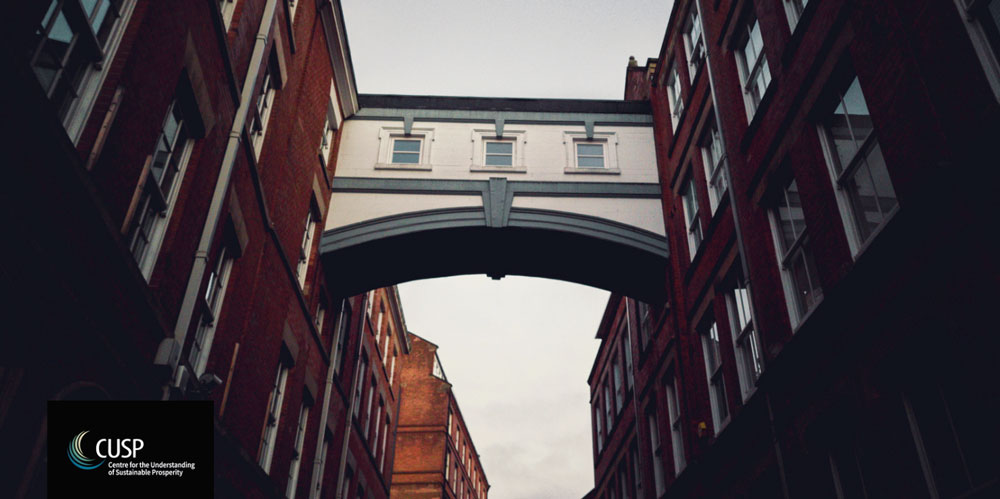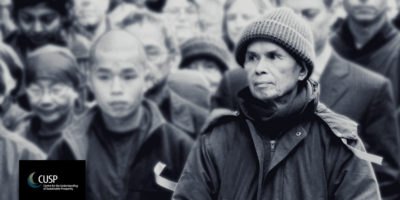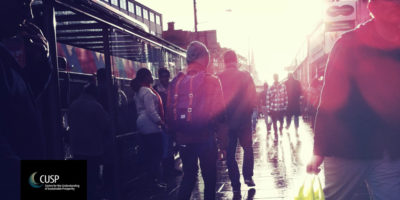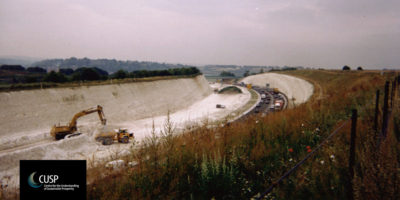Winning the Internal Election
For the podcast series Mum, Will the Planet Die Before I Do, British MP Nadia Whittome spoke to Babita Sharma about her efforts to bring climate education into the curriculum. In this blog post, CUSP fellow Katy Glassborow reflects on their conversation.
Blog by KATY GLASSBOROW

What would it take for you to enter politics? What demons would you have to wrestle aside to believe yourself capable? To muster the wild courage to cast the most crucial vote of all… the vote of confidence in yourself. No really, I’m serious.
Many of us boo from the sidelines of parliamentary democracy but could never in a million years imagine ourselves as potential MPs. However bad things get; however much we feel Parliament is booby-trapping the lives of working people, grenading the biosphere to make a rich minority even richer; we’d never countenance standing square against MPs in parliament.
By tapping out, I fear we’re complicit in collective democratic backsliding. A majority of us standing aside as an autocratic elite deem themselves exclusively worthy of ruling. We’ve allowed our liberal democratic political system to be occupied by people uninterested in actually representing us and our best interests.
Happily, this story is about someone who the above doesn’t apply to. Someone who stepped up, and from whom I believe we can learn important lessons about political agency.
Someone called Nadia Whittome, who threw her hat in the ring to stand as Labour MP for Nottingham East in the 2019 General Election. Nadia and her supporters hoped that by running, and campaigning on progressive, bold policies, that the quality of the debate would improve. This alone would have been victory enough for them. But then—Nadia won the seat! And in the process she became (at that time) the youngest MP in Parliament, at the age of 23, much to the delighted surprise of Nadia herself and her dedicated team.
Standing for election—but how?
To understand why Nadia put herself forward, when so many of us can’t see ourselves being able to do so, let’s scroll back to 2013. The coalition Conservative and Lib Dem government introduced a raft of benefit changes under the Welfare Reform Act. One change to benefit provision brought in under the Act, dubbed the ‘bedroom tax’, meant that if you lived in a Council home and had a spare bedroom, your benefits would be reduced. To Nadia’s mind, this was a cruel piece of legislation. People often don’t have any choice over what home they have. It’s not as if they can simply move to a smaller property. Even if they could, should they be compelled to do so. It’s their home, Nadia thought. There are many reasons why people might need a ‘spare room’, if they have a disability, or a child who comes to stay at weekends…
She felt so strongly that at just 16 years old, she joined a local campaign. She wanted to be part of the resistance against the tax. Fast-forward to 2019 and Nadia was still living in Nottingham. A city she loves. Just a year earlier, a young Swedish student had started the school strikes for climate. With Greta Thunberg came a wave of political and cultural shocks so powerful it was clear nothing would be the same again. Truth was spoken to power—children taking on adults—in government buildings and UN conferences. Young people took to the stage, leaning forward to speak loudly and calmly into microphones.
Young people became leaders in the moral debate. They’d read, understood and translated the climate science, and realised how interconnected it is with social inequalities, and the fantasy of perpetual economic growth. They had sniffed out a route to planetary survival that the adults couldn’t fathom.
By this time, Nadia had been politically active for seven years. She was part of a group of activists involved in local campaigning, keen for their city to have more representation. Desperate for change. Even though Nottingham East enjoys a Labour majority, Nadia and her fellow activists wanted to see a campaign that, for them, truly represented the left wing. That gave a platform for progressive policies like scrapping the ‘hostile environment’ for undocumented people, ending anti-trade Union laws and promoting a Green New Deal.
Bridging the streets and parliament
And it paid off. With the help of her supporters, Nadia’s success brought the change and the representation they’d craved. Nadia was not only the youngest MP in Parliament, but an LGBT MP and Nottingham’s first MP of colour.
Nadia felt honoured to represent her community, listen to their concerns, and take those concerns back to Parliament. It’s what she’d wanted when she was contemplating standing as an MP. Not to tell people what would make their lives better, but to listen, and feed back to Parliament.
For Nadia it means existing on the fringes of parliament, not getting fully sucked in and not getting lost in party politics and parliamentary jostling. She still campaigns with people on the streets, and views herself as a bridge between them and Parliament. After all, shouldn’t all MPs be the parliamentary voice for what’s happening on the outside? Hopefully it’s not such a radical parliamentary ambition, and Nadia is committed to staying rooted amongst the people.
Nadia sees the Government trying to crush people’s ability to protest through various pieces of legislation like the Policing, Crime, Sentencing and Courts Act, and the Public Order Act. Trying to make it more difficult to go on strike. But, she says, it’s precisely because protests and strikes have a real impact that the Government seeks to quash them. Despite these crackdowns, Nadia encourages people to keep feeling angry. Keep coming together, keep pushing back. Nadia wants us to keep protesting because although it may not feel like it’s bringing about change, it is.
Teach the future
Nadia belongs to the upper end of the youth climate activism generation and feels a special responsibility to represent not only her parliamentary constituents, but also her peer group. Peers who have been calling for climate education, making this a key demand in school strikes. So, one of the first things she did when she became an MP was to think about how the climate crisis shows up (or not) in the curriculum—how the emergency we all face is taught (or not) in schools.
Soon after being elected Nadia began working with young people and school students from a group called Teach the Future. Together they wrote and put forward a Climate Education Bill calling for the climate and ecological emergency—causes and solutions—to be woven like a golden thread throughout the education system. From early years, through primary, secondary and vocational courses as well.
The Teach the Future campaign asserts that the climate crisis is the biggest threat humanity faces, and so children should be taught about this in every subject, not just in optional subjects like GCSE geography or triple science. Threaded in correctly, so young people can learn about sustainable diets and sustainable food production in food tech. About how to install low-carbon heat pumps in plumbing courses at Further Education colleges.
This idea, Nadia says, is popular among both teachers and students. Teach The Future conducted a survey which showed that the majority of headteachers and teachers support the initiative. Even though they’re overstretched and under-resourced and may resist curriculum change as a result, climate education, like Black History, appears to be an area that educators are already forging ahead with in their own schools.
Climate education is so important to Nadia because she believes it allows young people to participate actively in problem solving, which can help tackle eco-anxiety, a growing problem for young people. A collective mindset and subsequent collective action can prevent young people feeling helpless, Nadia believes.
Putting a statutory framework around climate education provision isn’t a silver bullet for Nadia, but a small and significant part of the answer. The economy needs to be rapidly decarbonised to save us from climate catastrophe, but it’s all linked. To decarbonise our economy, Nadia says, we must have an informed public. Young people who are knowledgeable about the scale of the climate crisis, ready to be skilled up for the green jobs of the future.
This means reimagining what our economy and what our society could look like. Placing a different emphasis on the kind of skills that are taught and valued. For Nadia, this change should be underpinned by a Green New Deal, heavy investment in public services, and well paid, sustainable, unionised jobs.
Don’t outsource hope
Nadia was surprised how difficult it has been to secure cross-party support for an idea that essentially amounts to ensuring young people understand, and can adapt to, a changing climate.
She knew she needed support from Conservative MPs to have a chance of the Climate Education Bill being adopted. At first, Nadia says some of them laughed at her. She got a sense that some older MPs look at a young Labour MP and automatically think they know better. They told Nadia climate education is already taught adequately in schools. She explained that it’s only taught in optional subjects, and that if the Government is going to meet its own net zero targets and fulfil its own Green Jobs agenda, climate education is a necessary part of that.
The campaigning is now paying off though, and Nadia has managed to gain cross-party support across the House. Teach the Future campaign has the support of four Select Committee chairs, three of whom are Conservative MPs. It’s backed by the Labour Front Bench, and has been adopted as Labour Party policy. It has the support of MPs from the Green Party, the Liberal Democrats and the Scottish National Party.
Nadia believes continuing reticence amongst some is partly a result of vested interests. Influential people resisting system change because they benefit from extracting resources from our planet, and extracting wealth from our people. MPs who protect the interests of big oil are reluctant to vote for bold policies to tackle the climate crisis, or tackle the gross inequalities that result from soaring oil profits in the cost-of-living crisis, she says.
That’s why, for Nadia, it’s important to have a mass movement that demands change. And crucially, parliamentary representation of that movement, so that appropriate laws and windfall taxes could have a chance at being implemented.
Nadia plans to keep making noise until the Government listens to this growing body of children, teachers, parents, industry bodies, third sector bodies and trade unions demanding climate action. But the delay is frustrating, especially when older MPs talk about being inspired by youth climate activists.
It grates on Nadia. She says politicians shouldn’t outsource hope. To young people. To school strikers. To the kids who’ve forced climate to the top of the political agenda, and without whom it’s doubtful Parliament would have declared a climate and ecological emergency in 2019. Politicians who talk about being inspired by young people should act like they’re inspired, she says.
She pays homage to the work of previous generations of campaigners who stood up for the environment decades ago when it was unpopular, back when really no-one was listening. Our successes now, Nadia says, build on their earlier work.
Because of campaigning by the climate movement, year on year on year, it’s no longer possible for MPs or other public figures to be climate deniers. The conversation is shifting, and that hasn’t happened by accident. It’s been pushed there, Nadia says, so we’ve just got to keep pushing.
Nadia’s hope was that by entering politics, she could improve the quality of the debate. Our hope (through the podcast series, Mum Will the planet Die Before I Do?) is that by profiling individuals like Nadia—who are pushing for bold, thoughtful action on the climate crisis—a broader range of ‘normal’ people might identify with and relate to everyday changemakers like her.
People like you for instance, who could maybe, possibly go on to win your own internal election, and find yourself standing alongside her in Parliament. We’ve profiled a Labour MP here but other brands are available at a political party near you. Truly representative MPs of all political persuasions are key to safeguarding not only our climate but our true democracy. Have a think about it. The Climate Education Bill was tabled on 24 January 2023 and a second reading was scheduled for 24 March, but there wasn’t time for it to be debated before summer recess. The Bill is still live and will hopefully be debated in the next Parliamentary session.
Podcast
- To listen to Nadia on the podcast Mum, Will the Planet Die Before I Do?, please see our podcast page.
Links
- https://www.teachthefuture.uk
- https://bills.parliament.uk/bills/3070
- https://www.sos-uk.org/post/new-research-indicates-need-for-the-climate-education-bill
- https://www.bigissue.com/news/environment/our-education-system-is-failing-to-teach-us-why-nadia-whittome-is-joining-forces-with-students-to-push-climate-education-in-the-national-curriculum/
- https://www.bbc.co.uk/news/science-environment-62245185
- https://www.theguardian.com/society/2014/jul/17/bedroom-tax-housing-benefit-reform-explained



